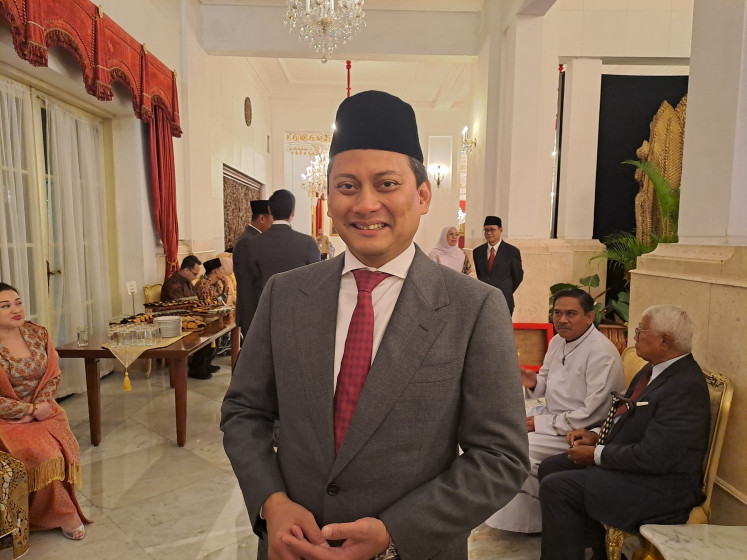Popular Reads
Top Results
Can't find what you're looking for?
View all search resultsPopular Reads
Top Results
Can't find what you're looking for?
View all search resultsBernard T. Wahyu Wiryanta: In the wild, hunting without killing
Amid the flora: Bernard says his work has made him aware of the inadequate documentation of endemic wildlife and plants in Indonesia
Change text size
Gift Premium Articles
to Anyone
A
mid the flora: Bernard says his work has made him aware of the inadequate documentation of endemic wildlife and plants in Indonesia.
Only a few people are interested in wildlife photography, a profession requiring tough effort in the wild and fairly long and expensive preparations ' and with a very low certainty of securing good pictures.
Photographic technical capability is just a bit of what is required. Also needed is knowledge of animal behavior, natural conditions and professional networks; a commitment of time; a mastery of technique as well as physical vigor. This activity is hunting without killing.
Bernardinus Realino Tri Wahyu Wiryanta is engaged in wildlife photography for a living after doing it as a hobby. Bernard's love of flora and fauna has made him aware of the inadequate documentation of the endemic wildlife in Indonesia.
Indonesia has a very small number of wildlife photographers. The one with the most complete archives of local flora and fauna is Alain Compost, a French snapper who has become an Indonesian citizen. He is now focusing on videography. The other active wildlife photographer of note is Riza Marlon, or Caca.
Bernard, born in Kendal, Central Java, 37 years ago, left for Jakarta as a high school graduate in 1996 to work with the nursery plantation of the Trubus agricultural magazine in Cimanggis, Depok, as a member of its cattle, fish and plant research staff.
Born into a family of journalists, Bernard has imparted the knowledge he has gained to the public through his writings and photographs.
Dozens of his books on agriculture have been published by AgroMedia Pustaka, six of which have been translated into Malaysian by Synergi Media, Malaysia.
Hundreds of his articles have been published in Harian Ekonomi and Bisnis KONTAN, Flona, Intisari and National Geographic. His pictures have been used by Agromedia Pustaka, Visimedia Pustaka and Transmedia.
'Bernard is an intelligent, hard worker capable of doing many uncommon jobs. He's a prolific writer and his books are bestsellers. It's very amazing,' said Kristianto Purnomo, a kompas.com photojournalist and a close friend of Bernard.
'He has joined research work such as that on buah merah [red fruit] from Wamena, Papua, which he extracted as a drug and reported on in a book titled The Efficacy of Red Fruit and Testimonials of the Cured,' Kristianto said.
Man with a camera: Born into a family of journalists, Bernard shares his knowledge of nature through writing ' he's published several books ' and photographs.
Bernard, who has studied sea birds and supported conservation at the Rambut Island Wildlife Sanctuary in Jakarta's Thousand Island's regency, set up the Wildlife Photographers Community.
As its founder, Bernard said that he wanted the organization to boost people's love of nature and encourage wildlife photography hobbyists to familiarize themselves with flora and fauna endemic to Indonesia.
Bernard wants people to be concerned about the environment, by among things through wildlife photo hunting on Rambut Island. He held an event titled 'Save Our Wildlife', where trees were grown on the island.
On that day, members of the Wildlife Photographers Community planted about 100 mangrove trees, assisted by Muhamad Buang, a leading environmentalist from Untung Jawa Island, Thousand Islands, who won the Kalpataru environment award in 2004.
Bernard, the father of three, is unwilling to rely on institutional financing like some photographers, let alone foreign funding, which he considers less flexible. Consequently, Bernard has to allow his savings to be drained.
In carrying out his profession, he gets a lot of help from Marfudin, his other close friend who in turn absorbs the ideas and experience of Bernard.
'I've known Bernard since 2004, when he was studying red fruit in Papua,' said Marfudin, a 2003 high school graduate. 'Thanks to the friendship with Bernard, I'm familiar with conservation and taking pictures. Now I've opened a wedding photography business.'
As a wildlife photographer who cares for the environment, Bernard doesn't overlook his birthplace on the slopes of Mount Prahu, located on the Dieng Plateau, a volcanic zone on the border area between Kendal and Wonosobo regencies in Central Java.
Along with his environment-oriented peers, Bernard established the Mount Prahu Conservation Foundation in 2013 and serves on its Board of Patrons.
'I'm also trying to prove that the extinction of Javanese tigers, as claimed by the international world, isn't true. Footprints of the tigers in the forest have been found in recent years,' Bernard says. 'To disprove the theory, there has to be evidence in the form of photos or video recordings with their dates and locations. If my research on Javanese tigers later proves to be correct, Mount Prahu will be made a wildlife reserve.'
Wildlife photographers are racing with those causing damage to the environment. Photographing is a process of recording natural history, while nature has been damaged faster than pictures can be taken.
In the field: Bernard poses with a nepenthes plant, known in Indonesia as Kantong Semar.
' Photos by PJ Leo













